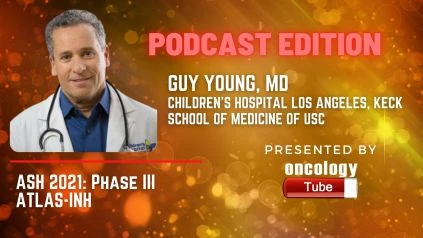Professor Guy Young, MD, Director, Hemostasis, and Thrombosis Center at Children’s Hospital Los Angeles, Professor of Pediatrics at the Keck School of Medicine of USC speaks about the ASH 2021 Abstract 4 Efficacy and Safety of Fitusiran Prophylaxis, an siRNA Therapeutic, in a Multicenter Phase 3 Study (ATLAS-INH) in People with Hemophilia A or B, with Inhibitors (PwHI).
Link to Abstract:
https://ash.confex.com/ash/2021/webprogram/Paper150273.html
Introduction:
Hemophilia A and B are rare bleeding disorders defined by inefficient clot formation due to thrombin production impairment caused by FVIII or FIX deficiency, respectively. Fitusiran is an experimental siRNA therapy targeting antithrombin that is delivered subcutaneously (SC) to restore thrombin production and rebalance hemostasis in persons with hemophilia A or B, with or without inhibitors. In this paper, we provide the results of a phase 3 trial that looked at the safety and efficacy of fitusiran prophylaxis for PwHI (ATLAS-INH; NCT03417102).
Methods:
The ATLAS-INH project is a randomized, open-label Phase 3 trial evaluating fitusiran’s efficacy and safety in PwHI. Eligible males aged 12 years who were taking on-demand bypassing agents (BPA) were randomly assigned to receive once monthly 80 mg SC fitusiran prophylaxis or continue to receive on-demand BPA in a 2:1 ratio. In the effectiveness phase, the primary endpoint is the annualized bleeding rate (ABR) in PwHI on fitusiran prophylaxis versus those on BPA on-demand. The secondary objectives are spontaneous ABR, joint ABR, and Haem-A-QoL-measured quality of life (QoL).
Results:
The study enrolled 57 people at random. At the time of screening, the average (range) age of the study participants was 28.4 (13-63) years old. Fitusiran vs on-demand BPA arm achieved statistical significance for primary and all secondary objectives, with significant reductions in ABRs of treated bleeds: all, spontaneous, and joint bleeds (Table 1). In the fitusiran arm, a total of 25 patients (65.8%) had no treated bleeding incidents. Fitusiran prophylactic medication was found to be effective in patients with hemophilia A and hemophilia B who had inhibitors. Improvement in physical health domain score was also statistically significant, with a difference (95 percent CI) of -28.72 (-39.07 to -18.37, p-value 0.0001), as well as overall HRQoL and between fitusiran and on-demand BPA arms.
At least one treatment-emergent adverse event occurred in 38 patients (92.7%) in the fitusiran arm and 11 patients (57.9%) in the on-demand BPA arm (TEAE). In the fitusiran arm, 13 treatment-emergent significant adverse events (TESAEs) were observed in 7 patients (17.1%), while in the on-demand BPA arm, 8 TESAEs were reported in 5 patients (26.3%). Device-related infection, hematuria, spinal vascular dysfunction, subclavian vein thrombosis, thrombosis, acute cholecystitis, chronic cholecystitis, and asymptomatic COVID-19 were all documented in one patient in the fitusiran prophylaxis arm. TEAEs were reported in one patient (2.4%) in the fitusiran group, resulting in the trial treatment being discontinued (spinal vascular disorder and thrombosis). There were no TEAEs that were deadly.
Conclusions:
The efficacy of the 80 mg monthly subcutaneous prophylactic dose of fitusiran in persons with hemophilia A or B with inhibitors was proven in this Phase 3 research. Fitusiran, in particular, reduced bleeding dramatically, with a median ABR of zero and a considerable proportion of persons experiencing no bleeds, resulting in a significant improvement in health-related quality of life. The reported TESAEs were generally in line with what would be expected in an adult or adolescent population with severe hemophilia A or B treated with inhibitors, or with the hazards of fitusiran previously documented. In ongoing clinical trials, a revised fitusiran dosing regimen with a lower dose and dose frequency is being tested.

